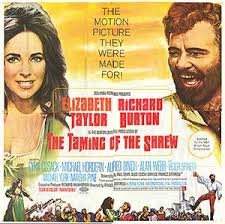
THE TAMING OF THE SHREW
US/Italy, 1966, 122 minutes, Colour.
Richard Burton, Elizabeth Taylor, Michael Hordern, Cyril Cusack, Michael York, Alfred Lynch, Natasha Pine, Alan Webb, Victor Spinetti.
Directed by Franco Zeffirelli.
The Taming of the Shrew is a very enjoyable version of Shakespeare's play. Richard Burton and Elizabeth Taylor were in the public eye in the '60s and made many films together. The director of this film was Franco Zeffirelli, a noted Italian stage director - in his native land, England and the United States. The film is sumptuous in its decor, settings, colour photography. Zeffirelli was to use the same method for his adaptation of Shakespeare's Romeo and Juliet. There is a pruning of the text but the highlights are kept. Many consider that Zeffirelli makes visual equivalents of Shakespeare's poetry. As with Romeo and Juliet, Zeffirelli used the effective music of Nino Rota. This film has an excellent supporting cast and includes Michael York in his first film role. The Taming of the Shrew is not a frequently staged Shakespearian play. It has formed the basis for many enjoyable stories of the battle of the sexes and was updated in the musical Kiss Me Kate, filmed with Kathryn Grayson and Howard Keel. It includes the humorous song in honour of the bard, 'Brush Up Your Shakespeare'. Zeffirelli was later to make such visually impressive films as Brother Sun, Sister Moon about St. Francis of Assisi, The Champ, and the famous teleseries Jesus of Nazareth with Robert Powell.
1. Why was this an enjoyable version of Shakespeare's play? How well presented was it on the screen? And the language?
2. Zeffirelli has been praised for his colour and his style. Is the praise justified in this production? Where was it at its best?
3. How well did Shakespeare survive this version of his play? The makers said they would have been lost without his words. Did they use Shakespeare's words well? Or did the film rely more on a visual presentation of Shakespeare? How?
4. Comment on the presentation of the world of Padua, its visual impact, the people and, their costumes and manners, sequences such as the university inauguration, the family at how, the details of the house and the rooms, the wedding and the Church, Petrucchio's house etc.
5. Though the film focussed on the world of Padua, were its issues more important, belonging to a wider world? How?
6. Lucentio opened the film with his arrival in Padua. The audience arrived as well. Were we want to identify with Lucentio? As we watched the life of Padua and the issues of the film? How sympathetic a character was Lucentio? As a naive student? In love with Bianca? Changing places with his servant? How important were these devices for the film - scholar, lover, teacher, servant?
7. The pretence and presentation of manners, how was hypocrisy a theme of the film? In which characters was it illustrated best?
8. How well did the film explore the nature of true love? In the two women? In the two men? In the father? In the suitor and the widow? How was the theme of marriage explored? The relationship between love and marriage?
9. How attractive a character was Blanca? In her presentation and contrasting with Katharine? Was Katharine attractive? Elizabeth Taylor's performance? Her tantrums? What was she protesting against?
10. How attractive a character was Petrucchio? Richard Burton's performance? His blustering manner contrasting with Padua? The role of his servant, Grumio?
11. How humorous and important for the thew was his encounter with Katharine? The physical vigour of the encounter? The use of words in the tongue-lashing? Why did they clash? Why did Petrucchio want to tame the shrew? How did he make a fool of her at the wedding? Where were your sympathies there? Katharine's willingness to go through the marriage? The people
laughing as they waited? His eventual arrival and the farcical nature of the wedding? Taking her off without eating? How central was this to the whole film and its meaning?
12. What did Katharine learn from her wedding, from being taken away from the feast, from the hardships of the journey, from Petrucchio's rudeness at home, his starving her etc.? Was this a good way for her to learn? Or was she merely tamed?
13. How important was the banquet scene for highlighting Bianca's wedding? were the preliminaries about Petrucchio’s father entertaining? Did it seem just that "all's well that ends well"?
14. The importance of the wager for the film? what did the audience expect? How dramatically was the wager presented? The surprise of the guests when Katharine returned with the other two women?
15. How important was Katharine's speech on women and their subjection to their husbands in the 16th. century? How does it sound today? Why? Was this the central waning of Shakespeare's story?
16. The film was often farcical, comical, Yet it looked lavish, sumptuous and beautiful. What values was it presenting? How successfully?